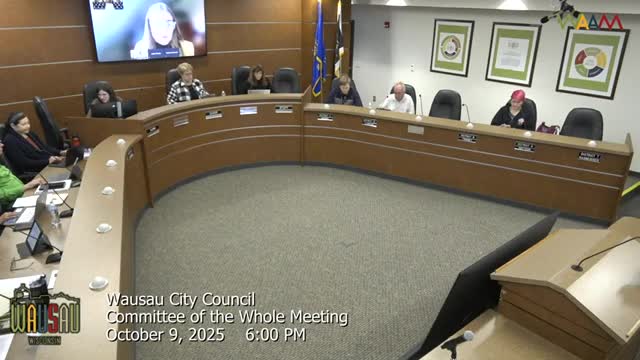Wausau council weighs referendum to fund 12 firefighters after SAFER grant ends
Get AI-powered insights, summaries, and transcripts
Subscribe
Summary
The Wausau Committee of the Whole discussed placing a levy referendum on the April ballot to keep 12 firefighter positions after federal grant funding expires. Staff and a consultant described outreach options, costs and timeline; council members asked for a pared-down communications option and scheduled a follow-up meeting.
Wausau’s Committee of the Whole discussed whether to put a referendum on the April 2026 ballot to fund 12 firefighter positions that would otherwise lose grant-supported pay, with staff and outside consultants outlining costs, outreach strategies and timing.
The proposal discussed on Oct. 9 would narrow the referendum ask to fund 12 firefighters and rely on other non‑referendum revenues (including GMT receipts and grant pursuit) to cover additional public-safety and police positions previously listed in the agenda. City staff recommended targeting the April election and hiring Miller Communications to run an educational (non‑advocacy) campaign if council authorizes it.
Why it matters: city officials said the Wausau Fire Department’s call volume has risen sharply in recent years while staffing and statutory standards have not kept pace; without new ongoing levy revenue, staff said some positions may be cut or other municipal services reduced.
Fire Chief Jeremy Cupp described the staffing and workload changes that drove earlier hiring and the department’s dependence on the federal SAFER grant: “Next year we’re gonna run over 7,000 calls,” Cupp said, noting the department once ran about 2,000 calls and that training and response standards have increased. Cupp told the committee the SAFER grant’s end creates a funding gap that city leaders are trying to address.
City finance staff summarized constraints of Wisconsin’s levy‑limit framework and the recent closure of Tax Incremental District 6, which the city said freed roughly $600,000 in levy capacity but left a remaining shortfall. “We were allowed to add about $600,000 to the levy because of the TID closure,” a staff member said, describing why a referendum would be needed for an ongoing increase rather than a one‑time appropriation.
Miller Communications representatives Caitlin Ross and Cass Bergaben presented an educational campaign scope and budget the firm said would reach households through up to three direct mailers, website materials, paid social media advertising and presentations. Ross said the campaign would be “educational in nature and would not advocate for a certain outcome.” The firm estimated professional fees plus paid media and three full‑color mailings to every household in Wausau would likely put the total in the mid‑to‑high five‑figure range; council discussion reduced that to a likely $65,000–$70,000 range if two mailings are used and some work is done in‑house.
Council members pressed on translation and inclusion: Miller said it could provide Hmong and Spanish translations and dual‑language mailers if funded. Some alderpersons asked for a pared‑down option in which Miller would produce core messaging or a single core creative piece and the city would repurpose it for newsletters, social media and other outlets to reduce cost.
The committee also considered a mailed community survey option from a third party (Community Perception) to measure public appetite for various staffing mixes, but members raised concerns about the tight timeline and low survey response rates. Ross said the survey would require immediate work to reach households in mid‑November and still meet the Jan. 27 ballot‑language deadline.
Public comment included Marie Schmidt of 1205 Purchase Street, who urged officials to prioritize residents’ basic needs before asking taxpayers for more money: “Stop the wants, concentrate on the needs, and you won’t have to worry about any referendum,” she said.
What the council decided or directed: committee members did not authorize full contracting with Miller at the meeting. Instead they asked staff and the vendor to return with a narrower menu of options and cost comparisons and set a follow‑up Committee of the Whole session for Nov. 3 at 5:15 p.m. to consider a recommendation. Finance committee work on the 2026 budget and additional information from Ehlers (the city’s financial advisor) were identified as inputs before a final council decision.
Context and next steps: staff said Wisconsin statutes restrict how referendum questions are worded and that the city would need to finalize ballot language by Jan. 27 to reach the April election. City staff and Miller will refine the scope and pricing for a limited consultation or full education campaign and return to the Committee of the Whole on Nov. 3; if the referendum is not pursued or fails, staff warned the city will need to identify cuts, position eliminations or other revenue sources to close the projected gap.
Ending: Council members asked colleagues to discuss the idea with constituents and to review the department’s recent reports; staff said more detailed cost estimates for the referendum question and examples of outreach materials would be circulated before the next meeting.
